In today's digital landscape, hiring a competent web developer is key to building a successful online presence. Companies often struggle with finding developers who not only possess strong technical skills but also fit seamlessly into the team. Many miss out on assessing soft skills and adaptability to fast-paced environments, which are critical to a developer's success. As a recruiter, understanding these nuances can make a significant difference in onboarding the right talent.
This article provides a comprehensive guide on hiring web developers, covering key skills and qualifications, drafting job descriptions, where to find talent, and recommended skills tests. Explore our Web Developer Online Test to effectively evaluate candidates.
Table of contents
Why Hire a Web Developer?
Hiring a web developer can significantly boost your company's online presence and functionality. Start by identifying specific web-related challenges your business faces, such as an outdated website, poor user experience, or lack of mobile responsiveness.
Consider the following scenarios where a web developer could add value:
- Creating a new, user-friendly website from scratch
- Optimizing existing web applications for better performance
- Implementing e-commerce solutions to expand your online sales
If you're unsure about committing to a full-time hire, consider starting with a freelance web developer for a specific project. This approach allows you to assess the impact before deciding on a permanent position. For a comprehensive hiring process, check out our guide on web developer interview questions to ensure you find the right fit for your team.
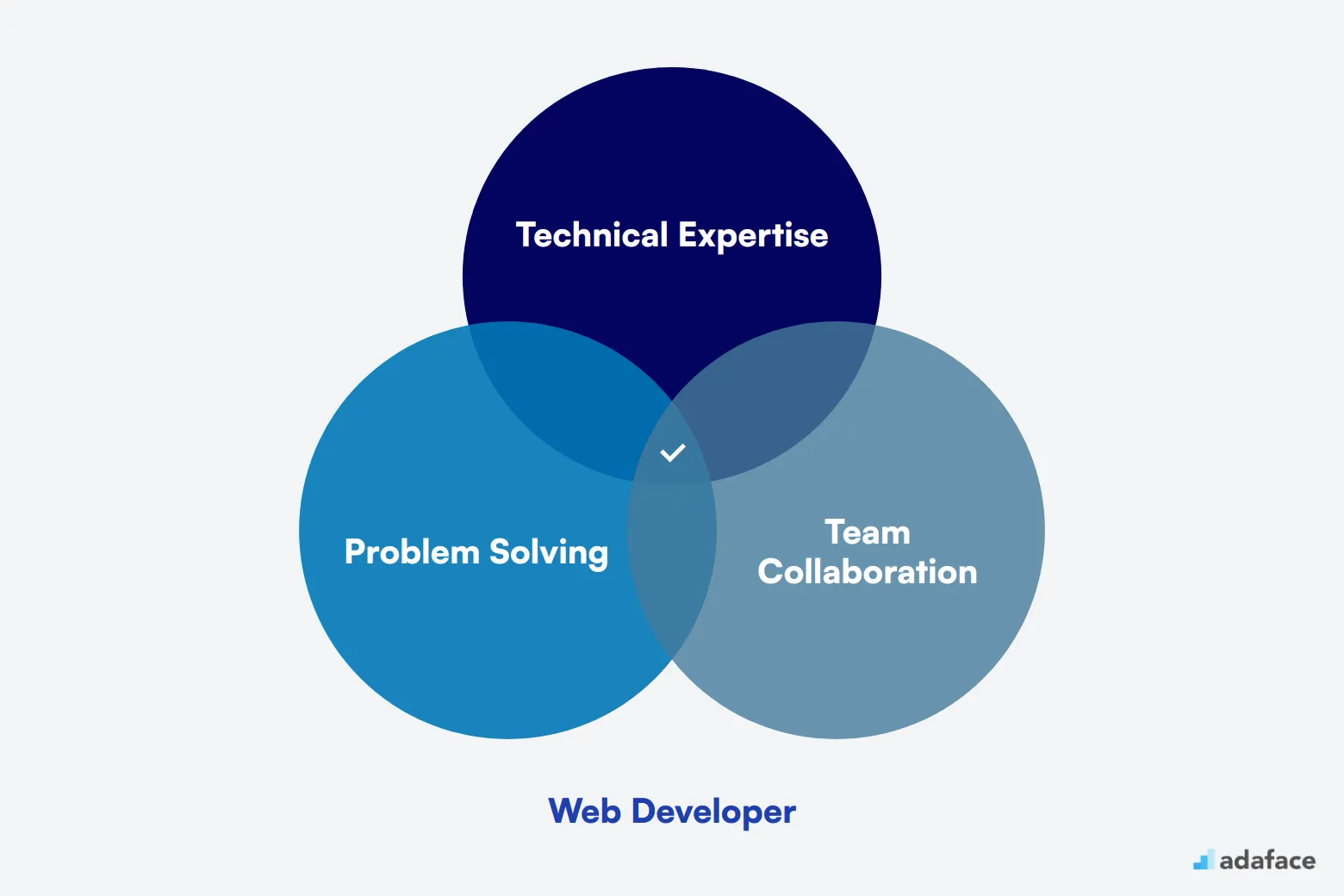
Key skills and qualifications for Web Developers
Creating an ideal candidate profile for a Web Developer can be tricky. What's required for one company might be just a preference for another. For example, while React is often a must-have for many Frontend Developer roles, your team might use Vue.js instead.
To help you get started, here's a quick overview of popular required and preferred skills for Web Developers. Remember to tailor these to your specific needs:
Required skills often include:
- Bachelor's degree in Computer Science or related field
- Proficiency in HTML, CSS, and JavaScript
- Experience with responsive design
- Knowledge of web frameworks (React, Angular)
- Strong problem-solving skills
Preferred skills might include:
- Experience with server-side languages (Node.js, Python)
- Familiarity with databases (MySQL, MongoDB)
- Understanding of version control (Git)
- Experience with RESTful APIs
- Proven teamwork abilities
When assessing these skills, consider using coding tests to evaluate candidates' practical abilities. This can give you a clearer picture of their technical expertise and problem-solving skills in action.
| Required skills and qualifications | Preferred skills and qualifications |
|---|---|
| Bachelor's degree in Computer Science or related field | Experience with server-side languages like Node.js, Python, or PHP |
| Proficiency in HTML, CSS, and JavaScript | Familiarity with database technologies such as MySQL or MongoDB |
| Experience with responsive and adaptive design | Understanding of version control systems like Git |
| Knowledge of web development frameworks such as React or Angular | Experience with RESTful services and APIs |
| Strong problem-solving skills and attention to detail | Proven ability to work effectively in a team environment |
How to write a Web Developer job description?
Creating an effective web developer job description is key to attracting the right candidates. Once you have a candidate profile ready, the next step is capturing that information in the JD to draw in talent.
- Highlight key responsibilities: Clearly outline the core responsibilities of the web developer role. For example, specify if they will work primarily on front-end, back-end, or full-stack projects, so candidates understand the expectations.
- Balance technical skills with soft skills: While it's important to list technical requirements such as proficiency in HTML, CSS, or JavaScript, don't forget to include soft skills like teamwork and problem-solving. This balance attracts candidates who are not just technically skilled but also a good fit for your team.
- Showcase your company's unique selling points: Make your workplace appealing by highlighting what makes your company special. Whether it’s opportunities for growth, innovative projects, or a collaborative environment, emphasize these aspects to stand out in a crowded job market. For a detailed structure, consider looking at the web developer job description template.
10 Platforms to Hire Web Developers
Now that you have a job description ready, it's time to source candidates through job listing sites. These platforms can help you connect with potential web developers who match your requirements and experience level.
LinkedIn Jobs
Ideal for finding full-time web developers with diverse experience levels. Offers extensive networking capabilities and detailed candidate profiles.

Indeed
Excellent for posting full-time web developer positions with a wide reach. Provides tools for resume searching and applicant tracking.

Toptal
Best for hiring top-tier freelance web developers. Rigorous vetting process ensures high-quality candidates for complex projects.
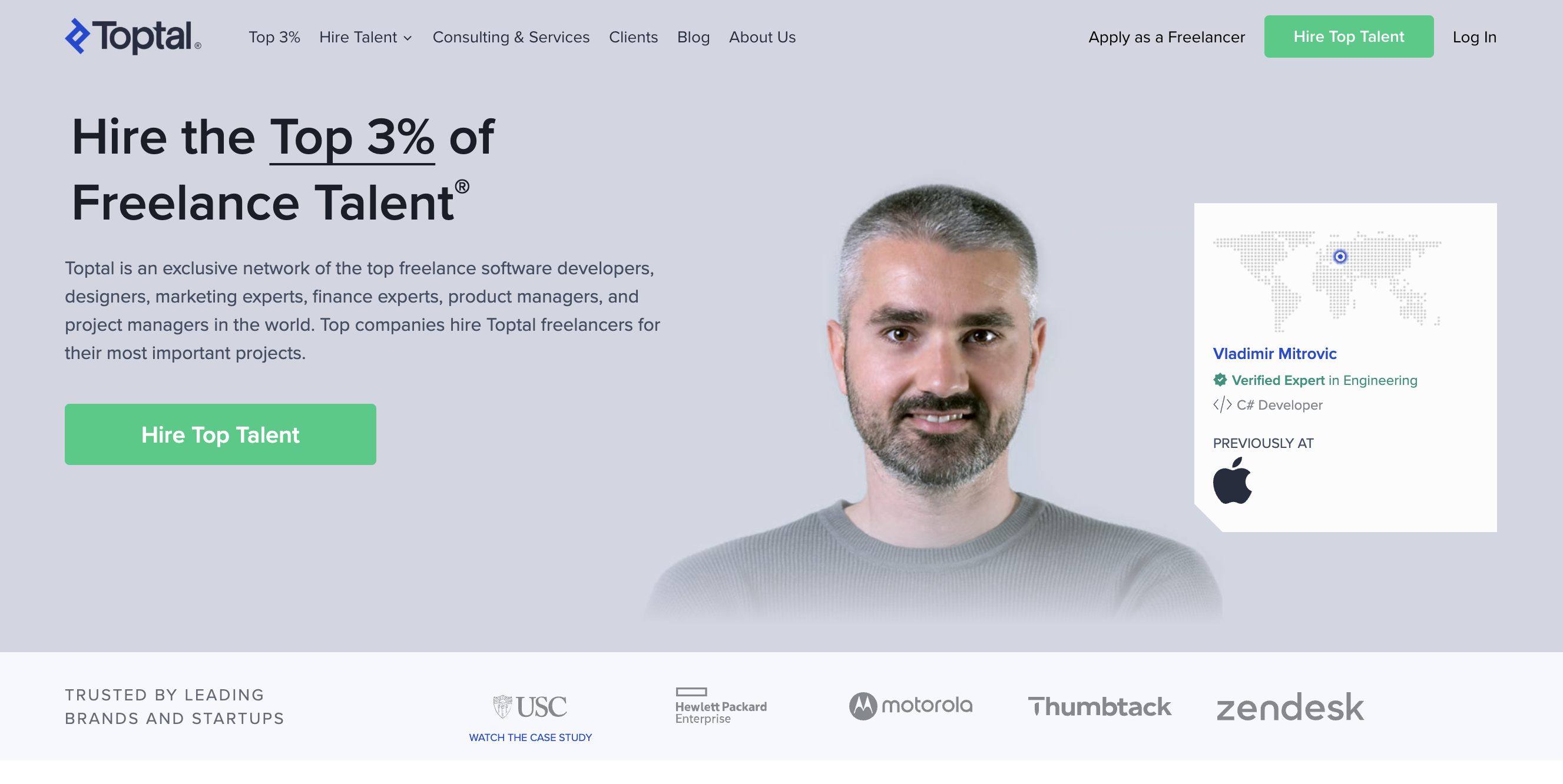
In addition to the initial three platforms mentioned, consider exploring other options like AngelList, which caters specifically to startups, or We Work Remotely, ideal for attracting candidates looking for remote work opportunities. If you're focusing on tech-specific roles, Dice and Stack Overflow Jobs provide targeted access to highly skilled professionals. Lastly, ZipRecruiter helps you reach a wider audience efficiently, making it a worthy addition to your recruitment toolkit.
Keywords to Look for in Web Developer Resumes
Resume screening is a key step in finding the right web developer. It helps you quickly identify candidates with the skills and experience you need, saving time in the hiring process.
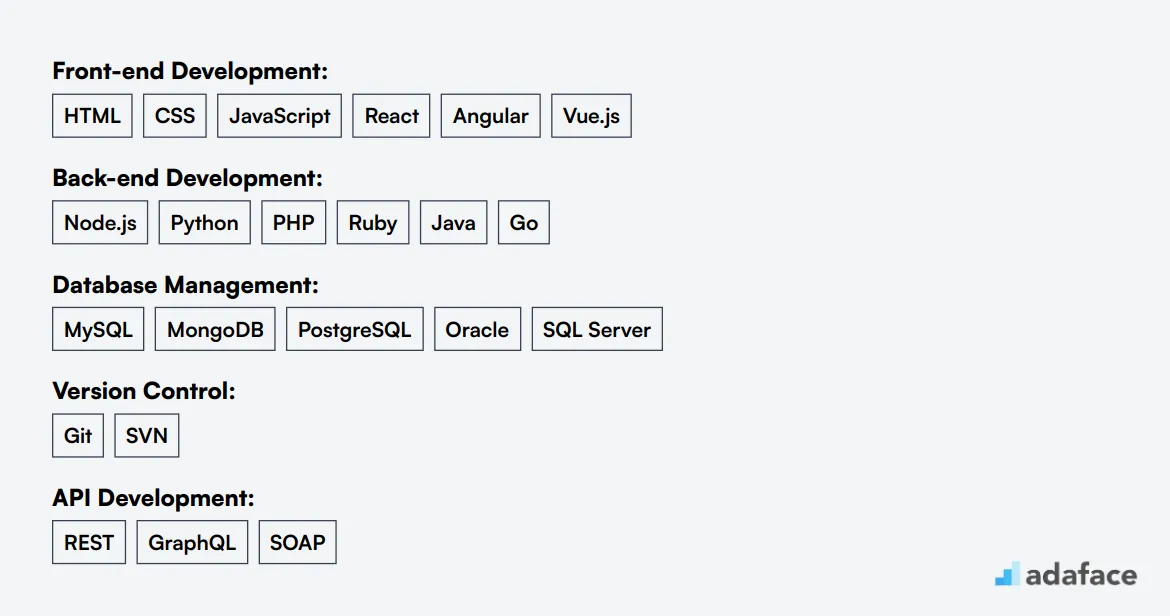
When manually screening resumes, focus on key technical skills like HTML, CSS, and JavaScript. Look for experience with popular frameworks such as React or Angular, and check for backend skills like Node.js or PHP.
AI tools can streamline the screening process. Use AI-powered platforms to scan resumes for relevant keywords and experience, helping you shortlist candidates more quickly and accurately.
Here's a sample prompt for AI resume screening:
TASK: Screen resumes for web developer role
INPUT: Resumes
OUTPUT:
- Email id
- Name
- Matching keywords
- Score (out of 10)
- Recommendation
- Shortlist (Yes/No/Maybe)
KEYWORDS:
- HTML, CSS, JavaScript
- React, Angular, Vue.js
- Node.js, PHP, Python
- Git
- RESTful APIs
- Responsive design
Customize this prompt based on your specific job requirements.
Recommended Skills Tests to Screen Web Developers
When hiring a web developer, skills tests offer a reliable way to gauge a candidate's practical abilities beyond what a resume can show. They help ensure the technical skills align with your team's needs. Here are some recommended tests to identify top talent.
Web Developer Online Test: This test evaluates candidates on key web development skills such as HTML, CSS, and JavaScript. It's ideal for understanding their capability to handle web development projects effectively.
JavaScript Online Test: JavaScript is integral to web development. This test measures a candidate's proficiency in using JavaScript to create interactive web elements and solve programming challenges.
ReactJS Test Online Assessment: If your projects use ReactJS, this test is a must. It checks a candidate's ability to build user interfaces with React, ensuring they can contribute to your development team from day one.
Node.js Test: For backend development using Node.js, this test assesses a candidate's skill in building scalable network applications. It ensures they can handle server-side tasks efficiently.
PHP WordPress Online Test: If WordPress is part of your tech stack, this test is crucial. It evaluates a developer's capability to work with PHP and WordPress, ensuring they can maintain and develop WordPress sites effectively.
How much does it cost to hire a Web Developer?
Hiring a Web Developer can vary significantly in cost depending on the location and experience level. In the US, salaries range from $47,708 to $139,164 with a median of $81,481. Australian developers have salaries averaging AUD 83,194 nationally, with higher averages in cities like Sydney and Melbourne. These figures provide a ballpark for setting budget expectations when hiring.
Web Developer Salary in the United States
Web Developer salaries in the United States vary widely based on location, experience, and specialization. The average salary range falls between $47,708 and $139,164, with a median of $81,481.
Top-paying cities for Web Developers include Tallahassee, FL, and Seattle, WA, with median salaries of $135,216 and $123,332 respectively. In contrast, cities like Irvine, CA, and New York, NY offer lower median salaries around $70,000 to $71,000.
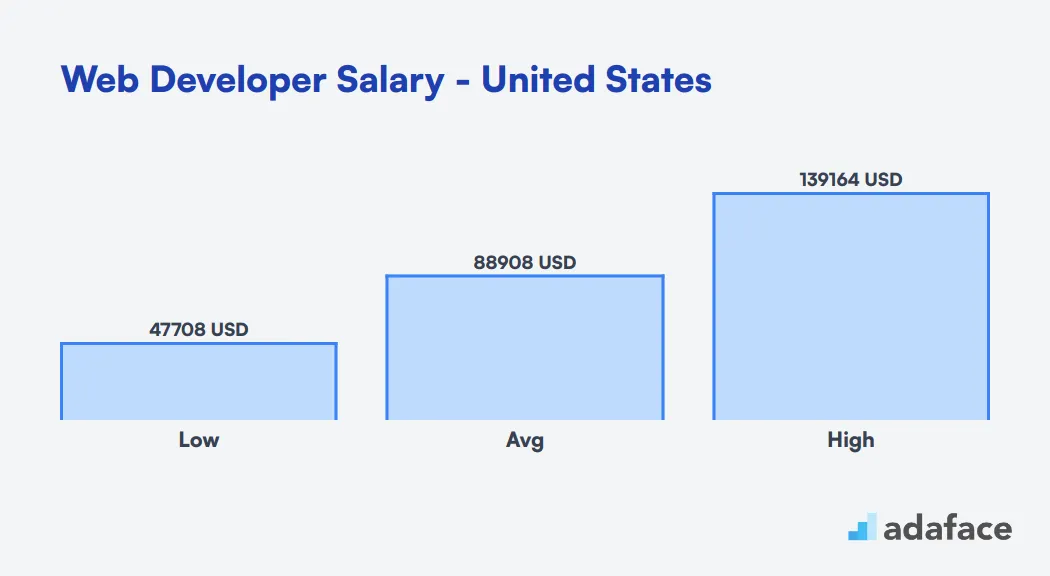
Web Developer Salary Australia
In Australia, the average salary for a Web Developer varies across regions. In cities like Sydney, the average salary is around AUD 95,960, while in Melbourne, it's about AUD 92,864. On the lower end, Web Developers in Adelaide earn an average of AUD 75,900. Nationally, the average salary is approximately AUD 83,194, providing a good benchmark for hiring managers when setting compensation expectations.
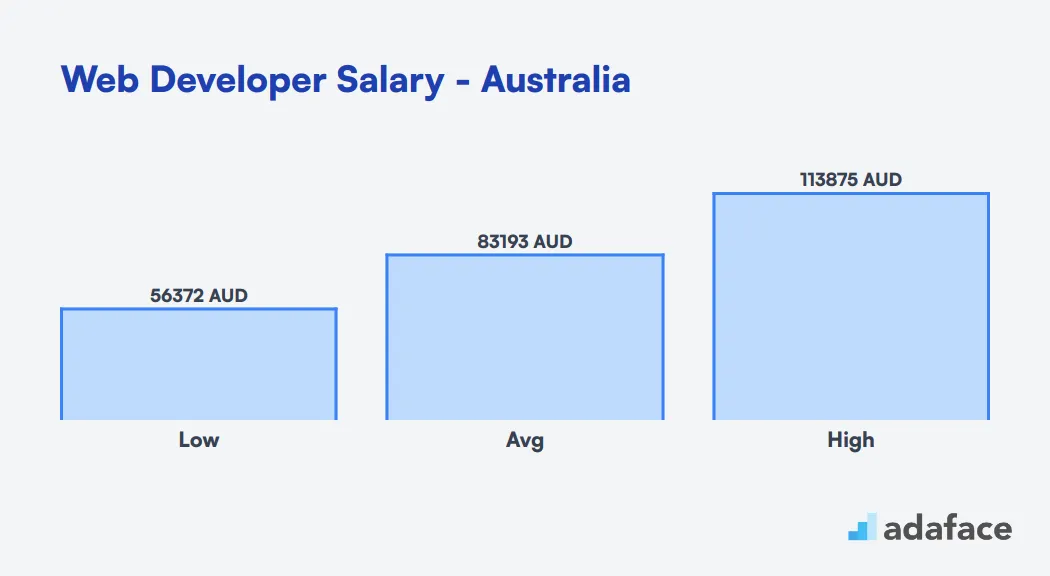
What's the difference between a Front-End Developer and a Back-End Developer?
Front-end and back-end developers often get mixed up due to their close collaboration in creating web applications. Both are essential to the development process, but they have distinct roles and responsibilities that set them apart.
A front-end developer focuses on the user interface and experience, crafting everything a user sees and interacts with. They primarily use programming languages like JavaScript, HTML, and CSS, working with frameworks such as React, Angular, and Vue.js. Their skills lean heavily towards design as they work closely with designers to implement visual elements.
On the flip side, a back-end developer is responsible for the server logic and database management that power the application. They use languages like Java, Python, and Ruby, employing frameworks like Node.js, Django, and Spring. Collaboration for them means working closely with database administrators to ensure smooth and efficient server performance.
For a deeper insight into the skills required for these roles, you can explore our skills assessment tools.
| Front-End Developer | Back-End Developer | |
|---|---|---|
| Programming Languages | JavaScript, HTML, CSS | Java, Python, Ruby |
| Primary Focus | User Interface, User Experience | Server Logic, Database Management |
| Tools and Frameworks | React, Angular, Vue.js | Node.js, Django, Spring |
| Design Skills | Strong | Minimal |
| Database Interaction | Minimal | Extensive |
| Collaboration | Works closely with designers | Works closely with database admins |
| Key Responsibilities | Implement visual elements | Develop application logic |
| Performance Optimization | Focus on loading speed | Focus on server efficiency |
What are the ranks of Web Developers?
Web developers often have different specializations and experience levels, which can lead to confusion about their ranks. Understanding these distinctions is crucial for recruiters and hiring managers to find the right fit for their team.
Junior Web Developer: This is an entry-level position for those new to the field. Junior developers typically work on simpler tasks under supervision, focusing on front-end development or basic back-end tasks.
Mid-level Web Developer: With a few years of experience, mid-level developers take on more complex projects. They often specialize in either front-end or back-end development, and can work more independently.
Senior Web Developer: These professionals have extensive experience and deep technical knowledge. They lead projects, mentor junior developers, and often make architectural decisions for web applications.
Lead Web Developer: Lead developers manage teams and projects. They bridge the gap between technical development and business needs, often interacting with stakeholders and making high-level decisions.
Full Stack Developer: While not strictly a rank, full stack developers are proficient in both front-end and back-end technologies. They can work across the entire web development stack and are valuable for their versatility.
Hire the Best Web Developers for Your Team
Throughout this blog post, we've explored the significance of hiring web developers, from understanding their key skills and crafting the perfect job description, to identifying the right platforms for recruitment and deciphering resume keywords. By grasping these insights, you can make informed decisions that contribute positively to your hiring process.
If there's one takeaway from our discussion, it's the importance of using accurate job descriptions and tailored skills tests to enhance your hiring accuracy. By utilizing role-specific assessments, such as our Web Developer Online Test, you can identify candidates who truly match your requirements. Implementing these strategies can streamline your recruitment journey and help you hire the best talent for your team.
Web Developer Test
FAQs
When hiring a web developer, look for skills such as HTML, CSS, JavaScript, and familiarity with frameworks like React or Angular. Strong problem-solving abilities and excellent communication skills are also important.
Use online assessment platforms like our Web Developer Online Test to evaluate technical skills. Consider practical coding tests and interviews focused on real-world problems.
Popular platforms include LinkedIn, GitHub, and specialized job boards like Stack Overflow Jobs. Consider using recruitment software to streamline the hiring process.
Focus on clarity and detail. Outline the required technical skills, experience level, and responsibilities. Highlight any team dynamics and project goals to attract suitable candidates.
Front-end developers focus on the visual and interactive aspects of a website, while back-end developers handle server-side logic and database management. Full-stack developers do both.
Web developers are commonly ranked as Junior, Mid-level, Senior, and Lead developers, each with increasing levels of responsibility and expertise.
Combine technical skills assessments with behavioral interviews to gauge cultural fit. Engage with candidates through practical coding challenges and collaborative projects during the interview process.

40 min skill tests.
No trick questions.
Accurate shortlisting.
We make it easy for you to find the best candidates in your pipeline with a 40 min skills test.
Try for freeRelated posts
Free resources



